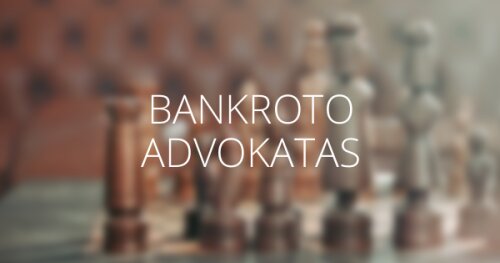Best Bankruptcy & Debt Lawyers in Republic of Lithuania
Share your needs with us, get contacted by law firms.
Free. Takes 2 min.
Or refine your search by selecting a city:
List of the best lawyers in Republic of Lithuania
About Bankruptcy & Debt Law in Republic of Lithuania:
Bankruptcy & Debt law in the Republic of Lithuania refers to the legal processes and regulations that govern individuals and businesses facing financial difficulties. The law aims to provide a framework for managing debts, protecting creditors' rights, and offering a fresh start to debtors in severe financial distress.
Why You May Need a Lawyer:
Engaging a lawyer specializing in Bankruptcy & Debt can be crucial in several situations, such as negotiating with creditors, filing for bankruptcy, understanding complex legal procedures, and protecting your rights throughout the debt resolution process.
Local Laws Overview:
In Lithuania, bankruptcy proceedings are regulated by the Law on Insolvency of Legal Entities and the Law on Insolvency of Private Individuals. Debtors can apply for bankruptcy if they are unable to pay their debts as they fall due. The process involves a court-appointed administrator overseeing the debtor's assets and liabilities, with the goal of distributing them fairly among creditors.
Frequently Asked Questions:
1. What are the different types of bankruptcy in Lithuania?
In Lithuania, there are two main types of bankruptcy for individuals: bankruptcy (bankrotas) and debt relief (neįgalumo procedūra). Companies can file for bankruptcy (bankroto procesas) or protective supervision (apsaugos priemonės).
2. How long does the bankruptcy process typically take in Lithuania?
The duration of the bankruptcy process in Lithuania can vary depending on the complexity of the case. On average, bankruptcy proceedings for individuals may last between one to three years, while corporate bankruptcies can take longer.
3. Are there alternatives to bankruptcy in Lithuania?
Yes, debtors in Lithuania may explore alternatives to bankruptcy, such as debt restructuring, negotiation with creditors, or entering into voluntary agreements to repay debts. It is advisable to seek legal advice to determine the most suitable option.
4. What are the consequences of bankruptcy in Lithuania?
Bankruptcy in Lithuania can have various consequences, including the liquidation of assets, restrictions on obtaining credit, and limitations on starting new businesses. Additionally, bankruptcy may impact a debtor's credit score and financial reputation.
5. Can creditors challenge a debtor's bankruptcy in Lithuania?
Yes, creditors have the right to challenge a debtor's bankruptcy in Lithuania if they believe the debtor is abusing the process or has undeclared assets. In such cases, a court may dismiss the bankruptcy application or modify the terms of the proceedings.
6. What debts are typically discharged in bankruptcy in Lithuania?
Debts that are typically dischargeable in bankruptcy in Lithuania include unsecured debts, such as credit card balances, personal loans, and medical bills. However, certain debts, such as taxes, child support, and court-ordered payments, may not be dischargeable.
7. How can a lawyer help with bankruptcy in Lithuania?
A lawyer specializing in Bankruptcy & Debt in Lithuania can provide legal advice, represent debtors in court proceedings, negotiate with creditors on their behalf, prepare bankruptcy petitions, and ensure that debtors' rights are protected throughout the process.
8. What are the criteria for filing for bankruptcy in Lithuania?
To file for bankruptcy in Lithuania, an individual must demonstrate that they are insolvent and unable to repay their debts. They must also meet the eligibility criteria set out in the relevant laws and comply with the procedural requirements for initiating bankruptcy proceedings.
9. Can a debtor keep any assets in bankruptcy in Lithuania?
In bankruptcy proceedings in Lithuania, debtors may be allowed to retain certain exempt assets, such as essential personal belongings, a primary residence, and tools of the trade. The specific exemptions vary based on the type of bankruptcy and the debtor's circumstances.
10. How can I find a qualified bankruptcy lawyer in Lithuania?
To find a qualified bankruptcy lawyer in Lithuania, you can contact the Lithuanian Bar Association for recommendations, seek referrals from other legal professionals, or research online directories of legal practitioners specializing in Bankruptcy & Debt law.
Additional Resources:
For additional information and resources related to Bankruptcy & Debt in Lithuania, you can visit the website of the Ministry of Justice, the Lithuanian Insolvency Administrators Association, or consult legal guides and publications on insolvency law in Lithuania.
Next Steps:
If you require legal assistance with Bankruptcy & Debt in Lithuania, it is advisable to schedule a consultation with a qualified lawyer specializing in this field. The lawyer can assess your situation, explain your rights and options, and guide you through the legal processes involved in managing debts and resolving financial difficulties.
Lawzana helps you find the best lawyers and law firms in Republic of Lithuania through a curated and pre-screened list of qualified legal professionals. Our platform offers rankings and detailed profiles of attorneys and law firms, allowing you to compare based on practice areas, including Bankruptcy & Debt, experience, and client feedback.
Each profile includes a description of the firm's areas of practice, client reviews, team members and partners, year of establishment, spoken languages, office locations, contact information, social media presence, and any published articles or resources. Most firms on our platform speak English and are experienced in both local and international legal matters.
Get a quote from top-rated law firms in Republic of Lithuania — quickly, securely, and without unnecessary hassle.
Disclaimer:
The information provided on this page is for general informational purposes only and does not constitute legal advice. While we strive to ensure the accuracy and relevance of the content, legal information may change over time, and interpretations of the law can vary. You should always consult with a qualified legal professional for advice specific to your situation.
We disclaim all liability for actions taken or not taken based on the content of this page. If you believe any information is incorrect or outdated, please contact us, and we will review and update it where appropriate.
Browse bankruptcy & debt law firms by service in Republic of Lithuania
Republic of Lithuania Attorneys in related practice areas.
Browse bankruptcy & debt law firms by city in Republic of Lithuania
Refine your search by selecting a city.















